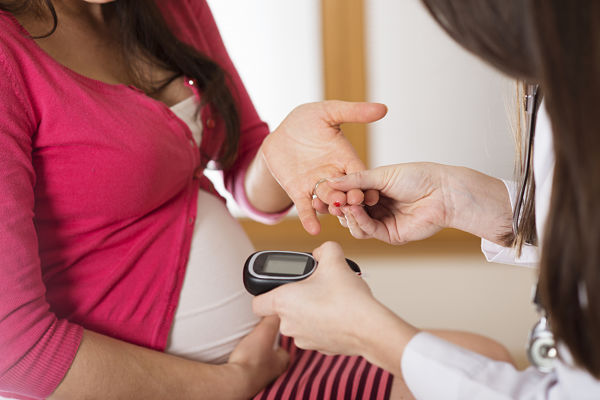Gestational diabetes – risks, symptoms, complications and treatment

Gestational diabetes is the name given to a form of diabetes which only occurs during pregnancy. Typically beginning between 24 and 28 weeks gestation, this is linked to the placenta producing the following hormones:
- Human placental lactogen (hPL)
- Human placental growth hormone (hPGH)
- Oestrogen
- Progesterone
As pregnancy progresses a higher level of these hormones are needed with hPL increasing by up to 30 times and hpGH increasing 8 times.
It is a normal part of pregnancy for your pancreas to triple its output of insulin to compensate for this, but in some women these increased hormone levels can lead to increased and even severe insulin resistance which then allows your blood sugar levels to rise.
Studies of pregnant women in different populations have concluded that a median range of 6% of European women and 13% of Middle Eastern and North African women will develop gestational diabetes. It is not clear why some women contract this illness and others do not, however we do know who is most at risk and this includes those who
- are overweight with a BMI of 30 or more going into pregnancy
- are over 35
- have a high level of stomach fat in the first trimester
- have a family history of gestational diabetes (GD)
- have a parent, sibling or child with diabetes
- have had a history of PCOS (Polycystic Ovary Syndrome)
- have pre-diabetes
- have previously had GD
- have been on bed rest
- previously had a baby which weighed over 4.5kg (10lb) at birth
- have family origins which are South Asian, Chinese, African-Caribbean or Middle Eastern (see my earlier blog post on diabetes and ethnicity)
As most women with this condition actually experience no symptoms it is usually picked up as part of your midwife or doctor checking a urine or blood sample. High sugar may be an indication of GD. Women who are at increased risk have a blood test following an oral glucose challenge at approximately 26 weeks pregnant.
Even if you do experience symptoms these are often hard to identify as being separate from normal pregnancy as these are:
- Increased thirst
- A dry mouth
- The frequent passing of large amounts of urine
- Fatigue
There have been a number of trials around the benefits of dietary supplements to prevent GD. So far fish oil has not been shown to be effective however probiotics have been shown to possibly benefit those at very high risk.
Treating gestational diabetes
High blood sugar can be reduced through a healthy diet and good levels of exercise; but for some women medication will also be required. This is decided within couple of weeks of your lifestyle changes. Whether you are prescribed tablets (usually metformin) or insulin you will also be given a blood sugar testing kit to track the effectiveness of your treatment and you will be closely monitored.
Once you have given birth you need take no more medication but you will normally have a blood test at 6 to 13 weeks after delivery to check for any incidence of diabetes.
If the results are normal you will be asked to attend annual checks.
Complications of gestational diabetes
Most women with gestational diabetes will have no other pregnancy problems and a healthy baby but it is important to be vigilant and to attend your medical appointments as some will experience things like:
- a higher risk of having a large baby and therefore a complicated labour and a higher likelihood of a C section
- an excess of amniotic fluid which can then cause premature labour
- pre-eclampsia
- the baby may be born before 37 weeks
- the baby developing low blood sugar (hypoglycaemia) or jaundice
- rarely it causes stillbirth
Long-term risk of future type 2 diabetes
Whilst most women will return to normal post birth data suggests that 66% of women with gestational diabetes will go on to develop type 2 diabetes within 15 years. This risk increases for older women and for Asian women. It can be seen as a useful warning sign of a weakness in your insulin action so to reduce that future risk it is important for you and your children to adopt a sensible diet and exercise programme.
I hope this has been helpful.










